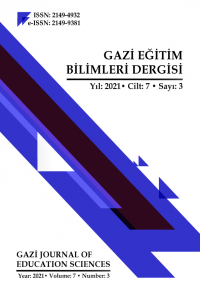Research Article
Aim & Scope
Gazi Journal of Educational Sciences (GJES); since 2015, it contributes to the teaching-learning process in Turkey. GJES includes researches that will provide resources to both national and international literature. GJES includes all kinds of publications in all areas of educational sciences. GJES is an international peer-reviewed journal and published three times a year. The numbers of our journal are March, July and November. GJES is accessible from the internet via dergipark.com.
GJES includes all kinds of publications in all areas of educational sciences and Turkish and English languages are accepted.
Original and high quality
studies including one or more of the following topics are accepted in the GJSE:
- Interdisciplinary studies involving different topics in educational sciences;
- Technological developments and their impact on educational sciences;
- Studies dealing with the various processes of teaching and learning comprehensively;
- Turkey and the world with the development of educational studies addressing separately or together,
- Studies involving innovative practices in education.
In addition to the studies carried out with qualitative and quantitative methods, the GEBD also includes articles that include theoretical and philosophical analysis of educational science.
Author Guidelines
TEXT: It should be written in Booq Antiqua font and 10 font size, and should not exceed 30 pages, excluding the scan text, including references and figures.
TITLE: It should be written in 14 font size with the first letters capitalized, it should be short and clear, reflecting the content. First degree titles in the text should be written in capital and bold, and only the first word of the title should be in italics.
ABSTRACT: It should be written between 200-250 words in Turkish and English. The English title of the study should be written on the English abstract.
KEY WORDS: It is suggested to be different from the concepts in the title. At least 3 and at most 7 basic concepts should be written in both Turkish and English.
ARTICLE SECTIONS: Research articles should include the titles of introduction, method, findings, conclusion, discussion and suggestions. The chapters may differ in articles such as review, phenomenology, biography, book presentation.
REFERENCES: In-text and end-of-text references should be in accordance with APA 6 style.
TABLES AND FIGURES: All tables and figures and their names should be shown in APA 6 format. Each visual should be presented in its place in the text. When the table does not fit on one page, small font size (9 or 8 points) can be used.For decimal values in a table or text, two digits after the comma should be used.
FORMULAS AND UNITS: All formulas should be written using equation from word document properties. Formulas should be given sequence numbers such as (1), (2). All units must be in the SI unit system.
SYMBOLS AND ABBREVIATIONS: It can be given at the end of the text, before the references.
ACKNOWLEDGMENT: The text of thanks should be given before the references.
Ethical Principles and Publication Policy
Journal Publication Ethics
Gazi Journal of Educational Sciences (GJES) is based on the scientific production, development and sharing of information. Publication ethics policy of the GJES is based on the guidelines and policies published by the Committee on Publication Ethics (COPE) in open access.
If it is determined that the data used in the articles sent for evaluation to the GJES are manipulated, distorted and fake data is used, this situation will be notified to the institution where the author of the article works in official ways and the article will be directly rejected. The journal management has the right to request data or output files from the authors according to the feedback given by the editor and / or reviewers.
Publisher's Ethical Responsibilities
Since 2015, the GJES has been a non-profit magazine aimed at delivering scientific developments to readers and interested parties in all areas of educational sciences under the editorial board or editorial board management.
The editorial board of the GJES consists of academic staff who are competent and accumulated in their fields. In the GJES, an editor and one or more field editors are designated as the chairman of the editorial board. A new member is appointed in place of the member who leaves these positions.
Responsibilities of the GJES Editorial Board
The editorial board is responsible for all the processes of every article that is applied to the GJES and the editorial board knows this responsibility. This responsibility requires independent decision making, considering the public interest. The relationship between the publisher and the editorial board is based on the principle of independence. All of the editors' decisions are independent of the publisher and other persons / organizations.
- The GJES editorial board strives to constantly improve the journal and improve its publication quality.
- The GJES editorial board sets out the basic principles for the determination and implementation of journal policies such as publication, blind review, evaluation process, ethical principles.
- The GJES editors board protects the copyrights of published article authors.
- The GJES editorial board is responsible for taking precautions regarding unethical behaviors such as intellectual property rights, scientific and unethical behavior, plagiarism and citation for ethics in the article and journal publishing process.
- The GJES editorial board prepares an "Author's Guide" containing the authors' information requirements, the "Reviewer Guide" containing the information the referees will need during the evaluation phase, and updates them when necessary.
- The GJES editorial board electronically stores the records of each article and correspondence about the journal.
Responsibilities of Editors and Field Editors
- Editors strive to meet the information needs of referees, authors, researchers, practitioners and readers, when necessary, to act according to the principles of clarity in matters requiring correction and explanation during the publication process.
- Editors pay attention to the originality of the articles, to the scientific literature, to the readers, researchers and practitioners while deciding to publish the articles.
- While making positive or negative decisions about the articles, the editors consider the originality of the articles, their contribution to the field, the validity and reliability of the research method, the clarity of the narration and the purpose and scope of the journal.
- Editors take preliminary evaluation, take into consideration positive referee suggestions unless the article has a major problem, and do not change the decisions made by previous editors unless there is a serious problem.
- The editors apply the blind review and evaluation process policies, which are among the publication policies of the journal, keep the identity information of the referees confidential, and ensure that each article is evaluated in an unbiased and timely manner.
- The editors send the articles to the editors who receive the articles and the referees, taking into account their expertise, and request that the evaluations be made unbiased.
- Editors pay attention to whether there is a conflict of interest or unity of interest among editors, reviewers and authors for an unbiased evaluation of the article.
- Editors are looking for a wide range of referees and to be constantly updated.
- Editors block unscientific evaluations that do not comply with academic etiquette.
- The editors ensure that the journal publishing processes are operated in accordance with the publication policies and guidelines, inform the areas of duty in the process about the developments in the publication policies, and prepare a training program when necessary.
- Editors communicate effectively with everyone involved in the publishing process and provide information periodically.
- Editors ensure the protection of personal data in the evaluated articles; they protect the individual data of the author, referee and readers.
- Editors pay attention to the protection of human and animal rights in the articles, they care about documenting the explicit consent of the participants of the article, they refuse the article when the ethics committee permits are not required in the researches that require permission.
- Editors take precautions against abuse of task. When there are complaints about abuse of duty, they conduct an objective investigation and share findings on the subject.
- Editors provide correction of errors, inconsistencies or misleading in articles.
- The editors protect the intellectual property right of the published articles, and defend the rights of the journal and authors in case of violation. In addition, they take necessary measures to prevent the content of published articles from violating the intellectual property rights of other publications; they perform originality-similarity control.
- Editors consider consistent criticism of articles published in the journal, giving authors of the right to respond to criticized articles.
- Editors also take into account criticisms of the work that includes negative results.
- Editors review complaints submitted to the journal and make necessary explanations.
Ethical Responsibilities of Referees
In the GJES article evaluation process, the referees of the authors apply the principle of two-way blind refereeing, where the referees do not know the authors, the referees cannot directly communicate with the authors. Article evaluation forms and notes on the text and correction requests are sent to the authors by the editors through the journal management system. Referees who will evaluate the articles submitted to the GJES should bear the following ethical responsibilities:
- Referees should only agree to evaluate articles related to their area of expertise.
- The referees must perform the assessment impartially and confidentially. Nationality, gender, belief, political view and commercial concerns should not disrupt the neutrality of the assessment.
- Referees should refuse to evaluate the article and inform the editors when they understand that there is a conflict of interest or unity of interest.
- Referees should make the assessment in a constructive language in accordance with academic etiquette; they should avoid comments that may be offensive or personal.
- Referees should evaluate the article they declare to evaluate within due time.
Authors' Ethical Responsibilities
The ethical responsibilities of the authors who apply to the GJES are:
Authors should send original articles to the GJES.
- Authors should not send articles to the GJES that they have published elsewhere or submitted for publication.
- Authors should accurately refer to the sources they use during the writing of the article in accordance with ethical principles.
- The authors should not write the names of the people who did not contribute to the article as author, they should not be suggested to change the author order, remove the author and add authors for an article that is applied for publication.
- They should notify the editors to those who have a conflict of interest or a unity of interest regarding the article for which the application is published.
- Authors should submit the expected information to the journal management in case of requesting information about the articles or raw data during the evaluation process.
- The authors should document that the rights to use the data they use in their articles have been obtained, the permission for research and analysis, or the consent of the participants they have researched.
- Authors should contact the journal management to provide information and correction when they notice the error regarding the article in the evaluation and early view phase or published electronically.
- The authors received the ethics committee approval for research that requires data collection through quantitative or qualitative methods such as experiments, questionnaires, scales, interviews, observations, focus group work that require an ethical committee decision; The ethical committee name, the date and number of the decision should be specified on the first-last page and method section of the candidate article, and upload the document showing the ethical committee decision to the system with the application of the article. In addition, they should include information about the receipt of the consent form in case reports.
- The authors should present the proofs that they pay attention to ethical principles in the data collection process (such as obtaining permission to use the documents such as the scale, questionnaire, photographs cited).
- The authors should state that articles comply with research and publication ethics and copyright regulations for intellectual and artistic works. If the research was carried out on human and animal subjects, the international decisions or guides of the research, etc. They must be reported that they are properly performed.
- Authors know that ethics committee approval is not required for articles made by methods such as compilation, mate-analysis, meta-synthesis, and content analysis. However, in articles that do not require an ethical committee decision, it should be stated in the article that an ethical committee decision is not required.
Reporting Ethical Policy Rule Violations to the Editor
In case of an unethical situation related to editors, referees, authors in the behavior or evaluation process in the GJES, an article in early view or a published article should be notified via e-mail to gaziegitimbilimleridergisi@gmail.com.
Price Policy
Gazi Eğitim Bilimleri Dergisi, makalelerin gönderim, değerlendirme ve yayınlanma olmak üzere hiçbir aşamasında yazardan/yazarlardan ücret talep etmez. Yazarlar dergiye gönderdikleri çalışmalar için makale işlem , gönderim veya abonelik ücreti ödemezler.
Indexes
Citation Indexes
Other Indexes
Journal Boards
Editor-in-Chief

Editorial Board













